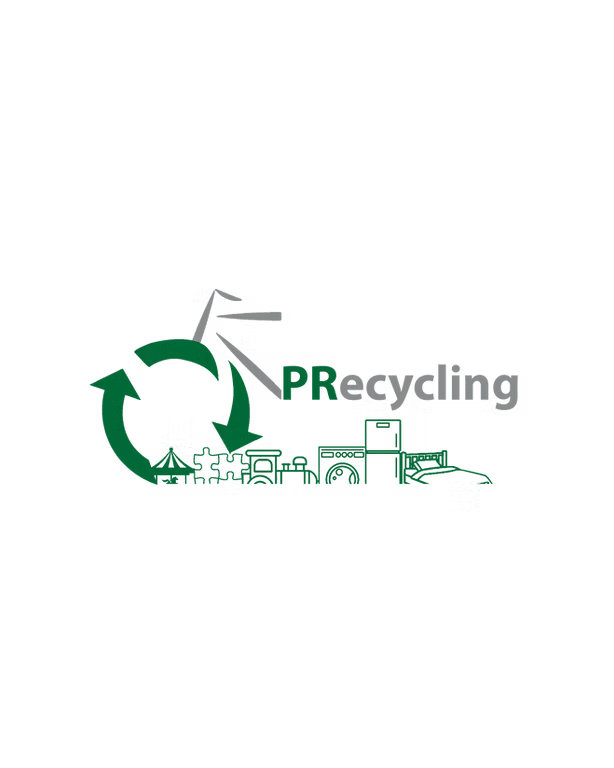Project Name: Plastics Recycling from and for home appliances, toys and textile
Description
PRecycling aims to develop an easy-to-use methodology for sorting, sampling, tracing and recycling plastic waste streams, including detection and separation of legacy additives, along with standard analysis procedures for both plastic waste materials and recyclates (secondary raw materials) in order to produce consistently high quality, safe-to-use recyclates based on their degradation degree and added-value products with predicted lifetime. Smart tracing via digital systems will be developed in parallel, to ensure the quality and safety of reused materials, targeting a sustainable, transparent and functional Circular Economy Model for the recycling market.
The above will be demonstrated, producing (I) home appliances components, (II) toys/learning resources, and (III) 100% recycled textile, starting from the same sector recyclates and different European regions. Demonstration activities will serve as part of a community awareness initiative, showing that 'from waste to product' transformation is scalable, replicable, traceable, commercially viable and most importantly, safe to use, both within the same and new supply chain products
PRecycling objectives:
- To screen and assess methods for verifying recycled plastic content in products and establish an EU broadly accepted definition of recyclate
- To improve and demonstrate sorting and detection technology of mixed thermoplastics from scrap and EoL products for maximising the amount and quality of recoverable raw materials
- To develop and demonstrate analysis procedure for recyclate quality and validation
- To detect and separate legacy additives in the plastic waste stream (PWS) and ensure safe recycling of plastics containing such additives by developing two alternatives with combination of options
- To boost the scope and efficiency of emerging thermoplastic recycling technologies to obtain secondary raw materials - recyclates - with lower environmental footprint than SoA processes
- To develop and validate methods and tools for circularity and traceability as well as allow the identification of origin of recycled materials via digital information management
- To disseminate innovation, overarching best practices, build-up communities, stimulate demonstration
- To ensure dissemination and suitable exploitation and engagement of society
The scope of PRecycling standardisation activities is:
- to screen and assess methods for verifying recycled plastic content in products,
- to establish an EU broadly accepted definition of recyclate and
- to contribute to current and new standardization activities to enhance market uptake of project results.
To this end, two dedicated Tasks are included as part of the project implementation. One Task regarding the review of methods and best practices used in industry /EU countries for calculating, verifying and reporting recycled plastic content in products will run for the first two years of the project until 31/3/2024. The second relevant Task dedicated to the development of a proposal of an EU broadly accepted definition of recyclate will run throughout the project duration until 31/3/2026.
Under the above-mentioned tasks the available methods, standards and certification schemes for recycled plastics will be reviewed. This includes i.e. methods used for establishing recycled content, composition of the recyclate, mechanical properties and screening on substances of concern. Best practices will be summarised in a report, which will also identify gaps in the available methods.
Furthermore, mapping of the existing definitions is currently being realised to support the development of a recyclate definition proposal. Realised research for detection of the existing standards and other formal documents, published or under development related to recycling will be considered for the establishment of the standard, emphasising on the identification needs for standards in the plastics recycling system and the related terminology/definitions. This review will be updated annually along the project execution to include new published documents and related research. Considering a series of needs and gaps on terminology and definitions that will be detected from consortium expertise involved in the technical activities, partners will propose recommendations and proposals, assisting the definition of all the terms that apply to the project, not covered by the existing documents.
Additionally, a series of contacts and networking is foreseen to be carried out in order to avoid overlaps among recycling related projects. Consortium would like to actively interact with relevant working groups and committees. The final conclusions on the plastic recyclate terminology will be delivered at the end of the project in the form of a Plastic Recyclate Handbook.
Reason for applying to HSbooster.eu services
At the current stage of the project (M12), the mapping and review of existing definitions related to recycling in standards or formal documents published or under development have started and the identified existing and standardised terms related to the recycling scope are being collected.
Furthermore, the available methods, standards and certification schemes for recycled plastics to establish the recycled content, recycled composition, mechanical properties and the screening of Substance of Concern (SoC) as well as the best practices are under review with gaps in current methods being identified and will be reported as a deliverable on 31/3/2024. This will include certification schemes, directives and standards, chemical compliance, methods used by the industry to report recyclates content, sample preparation methods, mechanical and rheological evaluation procedures, chemical evaluation procedures and degree of degradation evaluation procedures. In this context, further interaction with standardisation professionals will be established during the next period, to provide insight and guidance on the above.
Through services offered by Standardisation Booster, the following aspects of PRecycling standardisation activities are expected to be strengthened, in terms of:
- Information on the standardisation landscape in the plastic recycling sector
- Interaction with standardisation professionals and engagement of relevant Technical Committee (TC) and Work Group (WG) members for guidance and recommendations
- Gain insight into processes and outcomes of standardisation
- Networking and clustering activities with other projects/stakeholders with common interests and applications scope for the joint development of standards and exchange of best practices to overcome standardisation barriers
- Identification of standardisation gaps and recommendations for new standards
Project Acronym: PRecycling

Grant Agreement Id: 101058670
Start Date:
End Date:
Programme: HorizonEurope
Call for proposal: HORIZON-CL4-2021-RESILIENCE-01-10 Paving the way to an increased share of recycled plastics in added value products (RIA)
Funding Scheme: HORIZON-IA



